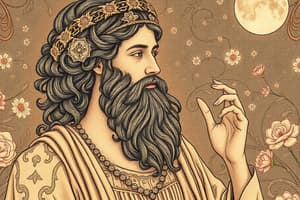Podcast
Questions and Answers
What does the term 'Philosophy' literally mean?
What does the term 'Philosophy' literally mean?
- Love of Wisdom (correct)
- Study of Existence
- Pursuit of Knowledge
- Understanding Reality
According to Socrates, what is the consequence of not examining one's life?
According to Socrates, what is the consequence of not examining one's life?
- It causes distress.
- It leads to ignorance.
- An unexamined life is not worth living. (correct)
- It results in societal disapproval.
What are the three elements of the Psyche according to Plato?
What are the three elements of the Psyche according to Plato?
- Desire, Logic, Reflection
- Appetites, Spirited, Mind (correct)
- Body, Mind, Spirit
- Intellect, Emotion, Volition
How does Aristotle define the concept of the soul?
How does Aristotle define the concept of the soul?
Which philosopher believed that the soul is superior to the body?
Which philosopher believed that the soul is superior to the body?
What did Aristotle identify as the three kinds of souls?
What did Aristotle identify as the three kinds of souls?
Which of the following philosophers is known for the Socratic Method?
Which of the following philosophers is known for the Socratic Method?
What does Aristotle believe is essential for a fulfilling life?
What does Aristotle believe is essential for a fulfilling life?
What principle is René Descartes famously associated with?
What principle is René Descartes famously associated with?
Which philosopher introduced the idea of Tabula Rasa?
Which philosopher introduced the idea of Tabula Rasa?
What does David Hume liken the Self and One's Mind to?
What does David Hume liken the Self and One's Mind to?
What are the three components of the mind according to Sigmund Freud?
What are the three components of the mind according to Sigmund Freud?
What does Immanuel Kant assert about the human mind?
What does Immanuel Kant assert about the human mind?
What philosophical view is associated with Paul Churchland?
What philosophical view is associated with Paul Churchland?
Maurice Merleau-Ponty's philosophy emphasizes which aspect of consciousness?
Maurice Merleau-Ponty's philosophy emphasizes which aspect of consciousness?
What phrase did Gilbert Ryle coin to describe the mind-body relationship?
What phrase did Gilbert Ryle coin to describe the mind-body relationship?
Flashcards are hidden until you start studying
Study Notes
Philosophical Perspective on the Self
- Philosophy originates from Greek, combining "Philos" (Love) and "Sofia/Sophia" (Wisdom), translating to "Love of Wisdom."
- Focuses on understanding fundamental truths about self, the world, and relationships with others.
Socratic Thought
- Socrates (470-399 BC), a foundational figure in Western moral philosophy, emphasized the importance of self-knowledge with the principle "Know Thyself."
- Introduced the Socratic Method, asserting "An unexamined life is not worth living."
- Proposed dualism of self, consisting of an imperfect, impermanent body and a perfect, permanent soul.
Plato's Contributions
- Plato (424-347 BC), student of Socrates, established the Academy in Athens, the first higher learning institution in the West.
- Described the psyche (mind) as composed of three elements:
- Appetites: Pleasurable desires.
- Spirited: Triumphs, honor, and affirmation.
- Mind: Rational and logical, choosing the best options for individuals.
Aristotle's Viewpoint
- Aristotle viewed the soul as the essence of self, rejecting the separation of body and soul.
- Focused on self-actualization and the rational nature of self as a path to a flourishing and fulfilling life.
- Identified three types of souls:
- Vegetative: Relates to physical growth.
- Sentient: Encompasses emotions and desires.
- Rational: Characterizes human intellect and understanding.
St. Augustine's Philosophy
- St. Augustine (AD 354-430), an African philosopher, asserted that the soul is superior to the body and identified a two-fold process of Self-Presentation leading to Self-Realization.
Descartes and Modern Philosophy
- René Descartes (1596-1650), known as the Father of Modern Western Philosophy, introduced Cartesian Philosophy, linking mental acts to physical actions.
- Coined "Cogito Ergo Sum" (I think, therefore I am), emphasizing the mind as an "intellectual substance" with will.
Locke's Tabula Rasa
- John Locke (1632-1704) proposed the concept of Tabula Rasa, suggesting individuals are born as blank slates, shaping identity through experiences, a cornerstone of Liberalism.
Hume's Perspective
- David Hume (1711-1776), a Scottish philosopher, likened the mind to a machine, suggesting the Self is only active during conscious moments.
Kant's Dual Self
- Immanuel Kant (1724-1804) posited humans have both an inner self (soul) and an outer self (body) and that reality is shaped by human perception.
Freud's Psychoanalysis
- Sigmund Freud (1856-1939), an Austrian neurologist, established Psychoanalysis, identifying three components of the mind:
- ID: Seeks pleasure and gratification.
- Superego: Conforms to societal norms.
- Ego: Balances the demands of ID and Superego.
Ryle's Behaviorism
- Gilbert Ryle (1900-1976), a British behaviorist, introduced the idea of "The ghost in the machine," suggesting individuals have two histories: a public one (behavior) and a private one (mental states).
Merleau-Ponty's Embodied Self
- Maurice Merleau-Ponty emphasized that the self is grounded in embodied subjectivity and that consciousness is a matter of capability ("I can") rather than mere thought ("I think that").
Churchland's Materialism
- Paul Churchland (1942-) asserted a perspective of materialism, arguing that only matter exists, shaping understanding of the self in a physical context.
Studying That Suits You
Use AI to generate personalized quizzes and flashcards to suit your learning preferences.




